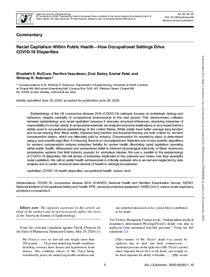Racial capitalism within public health: how occupational settings drive COVID-19 disparities

McClure, Elizabeth S. ; Vasudevan, Pavithra ; Bailey, Zinzi ; Patel, Snehal ; Robinson, Whitney R.
American Journal of Epidemiology
2020
Early View
1-10
epidemic disease ; social inequality ; race ; type of work ; health status ; occupation disease relation ; workers' compensation
Social protection - Health policy
https://doi.org/10.1093/aje/kwaa126
English
Bibliogr.
"Epidemiology of the US coronavirus disease 2019 (COVID-19) outbreak focuses on individuals' biology and behaviors, despite centrality of occupational environments in the viral spread. This demonstrates collusion between epidemiology and racial capitalism because it obscures structural influences, absolving industries of responsibility for worker safety. In an empirical example, we analyzed economic implications of race-based metrics widely used in occupational epidemiology. In the United States, White adults have better average lung function and worse hearing than Black adults. Impaired lung function and impaired hearing are both criteria for workers' compensation claims, which are ultimately paid by industry. Compensation for respiratory injury is determined using a race-specific algorithm. For hearing, there is no race adjustment. Selective use of race-specific algorithms for workers' compensation reduces industries' liability for worker health, illustrating racial capitalism operating within public health. Widespread and unexamined belief in inherent physiological inferiority of Black Americans perpetuates systems that limit industry payouts for workplace injuries. We see a parallel in the epidemiology of COVID-19 disparities. We tell stories of industries implicated in the outbreak and review how they exemplify racial capitalism. We call on public health professionals to critically evaluate who is served and neglected by data analysis and to center structural determinants of health in etiological evaluation."
Digital
The ETUI is co-funded by the European Union. Views and opinions expressed are however those of the author(s) only and do not necessarily reflect those of the European Union or the ETUI.